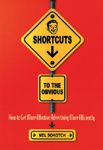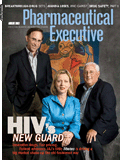Creativity Through Understanding
Mel Sokotch has seen his share of consumer advertising, having worked in the business for nearly 30 years. He's done time at Foote Cone & Belding and Grey Advertising, and he's handled campaigns for Merck, Pfizer, and Eli Lilly. Most recently, Sokotch penned Shortcuts to the Obvious, a how-to book documenting common marketing mistakes and the ways in which agencies can better position ads. The book is geared toward general consumer advertising, but it includes numerous pharma examples. Pharm Exec caught up with Sokotch to learn more about what marketers can do to build better campaigns.
Mel Sokotch has seen his share of consumer advertising, having worked in the business for nearly 30 years. He's done time at Foote Cone & Belding and Grey Advertising, and he's handled campaigns for Merck, Pfizer, and Eli Lilly. Most recently, Sokotch penned Shortcuts to the Obvious, a how-to book documenting common marketing mistakes and the ways in which agencies can better position ads. The book is geared toward general consumer advertising, but it includes numerous pharma examples. Pharm Exec caught up with Sokotch to learn more about what marketers can do to build better campaigns.

What are some of the positive aspects of DTC marketing in pharma?
If done right, DTC is highly effective, not only from a business standpoint, but also from a greater-good standpoint. The amount of above-the-line advertising spending in pharma in 2006, when the full story is told, will probably approach $5 billion—that's an enormous number. I think it's third or fourth among all big categories. In just about 10 years, traditional advertising has become incredibly important to the pharma business, and the return on investment, if the program is done right, pays back.
What about the argument that DTC isn't promoting health but is just a way to sell more drugs?
You can argue both sides. The Kaiser Family Foundation, which is an independent organization that studies healthcare, did a study about five or six years ago about whether DTC helps or hurts the healthcare industry. What it found was that the people suffering from significant conditions who weren't getting diagnosed and treated are now getting help. The foundation found that there is some opportunism and some stupidity and some mistakes that take place in this business. But at the end of the day, more people get treated as a result of communication that informs consumers that a disease or symptoms can be dealt with effectively if they talk to their doctor.
What trends do you see in today's DTC marketing?
Television is still critical to this business, because it is the one medium that can reach virtually everybody very quickly. But television is being used differently today than it was five years ago. The integration of television and the Internet is much bigger than the sum of its parts. So we're seeing a lot more television ads driving patients not directly to their doctor, but to a Web site where they can learn more, get educated, and then go into their doctors' offices and have an even more meaningful dialogue.
What are some common mistakes pharma marketers are making?
Without question, there are some awful campaigns on the air that aren't clear, that don't take the subject seriously—and you'll find some opportunism out there. There are some ads that I have to work very hard to understand what that commercial is all about. When you're up against nine commercials in a station break, clarity is incredibly important. And it becomes an even greater challenge for DTC, especially on the branded side of it where you've got to detail fair balance, which includes side effects and a number of different calls to action. So, the challenge becomes, how do you lay all that information out in a way that's interesting but also clear?
How can pharma marketers deal with situations where they are creatively constrained?
The creative output in DTC is much better today than it was 10 or 15 years ago, but the challenge continues to be this: This is a heavily regulated industry and getting a communication out to a consumer means that you have to incorporate a lot of caveats, including side effects, contraindications, and a number of different ways where the consumer can access all of that detailed information. That is a lot of information for a creative team to deal with. So many of the most creative people in this business shy away from DTC advertising because they believe, I think erroneously, that all of these regulations will limit their creativity. The fact of the matter is, if you study and embrace the rules and regulations and you understand what they're really talking about, you can create wonderful advertising.
Do DTC's detractors have a valid point when they say that DTC is causing patients to demand drugs they might not need?
I think a lot of the watchdogs and critics have a good argument—there has been a lot of opportunism in the business. Vioxx, for instance: The COX-2 products were initially indicated for people who had significant arthritis who were taking 10, 12, 15 aspirins a day. The market ended up marketing those products for charley horses on the weekend, and they were overprescribed. I also think the erectile dysfunction (ED) medicines made egregious mistakes by running provocative advertising in programming that was watched by inappropriate audiences, like kids. Running ED-medicine ads during the Super Bowl, I think, is a mistake. And obviously it's been banned since then. So I think the critics certainly have some ammunition on the one hand. On the other side, I hope we, the defenders, will end up prevailing in this thing.

Mel Sokotch is the author of Shortcuts To The Obvious: How to Get More Effective Advertising More Effectively
What advice would you give a pharma marketing team trying to market a new drug that they're not quite sure how to handle?
They must study and embrace the FDA regulations for product-claim advertising and for disease-awareness advertising, and they must study and embrace the regulations from Pharmaceutical Research and Manufacturers of America (PhRMA). They should look really carefully at some of the most creative advertising on the air and study how they handled the regulations and were still able to be creative. There are Web sites that agencies can visit to get all the letters that have been written to advertisers about advertising that was in violation and look at what was wrong with those commercials to avoid those pitfalls.
What pitfalls would you tell them to avoid?
There are two really big pitfalls in this business: one is minimizing the side effects and the other is expanding on the indication. Industry has gotten in trouble for obscuring the warnings in commercials, and that is a terrible mistake. But on the other hand, there's always this interesting issue in terms of how to present the benefit. One of the medicines for social anxiety, Paxil, got a letter of violation a number of years ago. It was indicated for social anxiety, and that means you're afraid to go out and you really have a panic attack when you get involved with a bunch of people. The ad was presenting people who were simply nervous or fearful about social situations. Both minimizing risk and expanding on the indication are pitfalls that have got to be carefully watched.
Do you think there's any chance that DTC in the United States could be abolished?
If industry had stayed on the trajectory it was on a few years ago–marketing certain medications, emphasizing too many lifestyle medications, and running inappropriate advertising in the wrong programming–I think the whole thing could have been lost. Congressmen were saying, "Hey, I don't want to be watching a family program with my granddaughter when an ED commercial comes on the air and I have to explain it to them." So long as industry operates in a responsible way, I think DTC will be fine. It's hard to regulate everybody when we've got an open market. There are going to be mistakes, and there's going to be opportunism, and there's going to be stupidity from time to time. I think the PhRMA guidelines have made a big difference, but I think the industry's really going to have to continue to work on regulating itself.
The Misinformation Maze: Navigating Public Health in the Digital Age
March 11th 2025Jennifer Butler, chief commercial officer of Pleio, discusses misinformation's threat to public health, where patients are turning for trustworthy health information, the industry's pivot to peer-to-patient strategies to educate patients, and more.
Navigating Distrust: Pharma in the Age of Social Media
February 18th 2025Ian Baer, Founder and CEO of Sooth, discusses how the growing distrust in social media will impact industry marketing strategies and the relationships between pharmaceutical companies and the patients they aim to serve. He also explains dark social, how to combat misinformation, closing the trust gap, and more.
